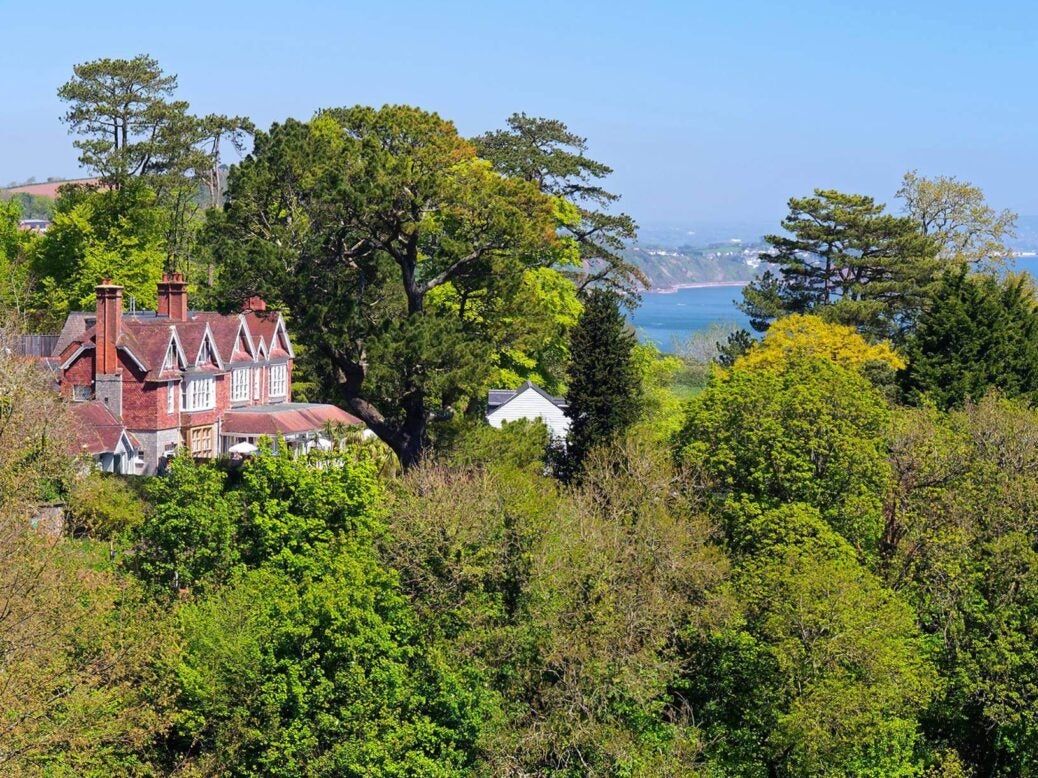
Ethereal views and a warm microclimate are enough to draw one to this charming Georgian manor, writes Rasika Sittamparam
A trip to the Jurassic Coast near Lyme Regis – a site covering over 180 million years of British History – is enough to mesmerise one’s senses to the point of exhaustion, largely due to the rigorous search for fossils one is encouraged to attempt. I gave up on the idea of being Indiana Jones after a futile few hours on the clay beach of Charmouth, yearned for a soothing bath and perhaps a snooze. We embarked on an hour’s drive to Maidencombe for Orestone Manor, a family-run country house hotel that I heard is well-received by the locals.
I arrived at my destination: a cool apple-green hued Georgian manor on top of a hill with a view of the English Channel glimmering in the afternoon sun. There is history here too as this is the birthplace of the world’s first ever Christmas card in 1843, according to a plaque proudly positioned by the entrance. The manor was built by John Callcott Horsley, a landscape artist enamoured by its oceanic views. Horsley’s first design of the Christmas card was commissioned by Sir Henry Cole, the V&A’s first ever director who went on to print 1,000 copies. There are 18 cards left now of this historic batch, one of which was recently sold for around £22,000 – a jump by a magnitude of four from the original price of a shilling (£0.05).
A casual but genial welcome by staff members further intensified the out-of-London experience here. One of them led me to Room Three – the sanctuary I’d patiently waited for – and thankfully, it did not disappoint. I was initially startled by the psychedelic effect of the Henry Moore wallpaper, with palm tree motifs giving the space a tropical buzz. I fixated myself instead upon the Art Deco ‘sleigh bed’, draped over with a red velvet throw.
The bed and the rest of the furnishings provided a cool contrast with the busyness of the palm frond walls. Together with the cushioned seats underneath the bay windows, overlooking Lyme Bay, the atmosphere reached a surreal point, especially when I glimpsed the red of the setting sun.
Out of Room Three, I headed for the gardens at the back of the manor, which had a completely different look to its pastel front. The red brick exterior was surrounded by evergreen palm trees, perhaps a testament to the warm microclimate of this part of the English Riviera. My room’s palm-themed wallpaper made sense to me, and the overall effect of the green terrace and gardens was all manner of pleasant.

Thoroughly calmed from the morning’s adventures, I head to the restaurant to sample the chef/owners’ culinary flair. Husband and wife team, Neil D’Allen and Laura D’Allen, are both executive chefs at the manor who are passionate about local produce, with some of the vegetables sourced straight from their gardens. ‘This wonderful location has the absolute best from land and sea,’ Neil proclaimed. ‘With an emphasis on modern European food, we source the finest, fresh ingredients and are spoilt for choice in this idyllic part of South Devon.’
Dinner was served, and the frontline service was singlehandedly manned by one cheerful and dedicated waiter. I’m not usually a fan of liver, but I decided to trust D’Allen’s skills and gave the chicken liver parfait a go. A thick pink slab of the stuff arrived, arranged neatly on buttery brioche and delicious red onion marmalade. I gave the dish a thumbs up, deciding to join the cult of liver and foie gras for one day.
Next, the much awaited pork belly arrived – a dish which looked eager to please – with red wine jus, crackling, vegetables and mustard mash accompaniments. If I’m going to be pernickety, I expected more crunch and softness from the meat, but perhaps it was a cut of belly I was less accustomed too. However, classic flavours did emanate from the jus and the fresh-tasting vegetables, and the tang of mustard in the mash proved to be an excellent pairing with the well-cooked meat.
From the mode of relaxation, my body signalled for slumber – at which point my Dutch apple crumble with crème anglaise appeared. I tasted a few delicious spoonfuls out of politeness and decided to call it an evening to head back to the embrace of my king-sized bed. With the rate of rejuvenation I was experiencing in mind, I considered a return to the coast the next day, for one final round of fossil-hunting.

Rasika Sittamparam is a senior researcher and writer at Spear’s
Related
Why the English are still charmed by Dinard
Review: Bulgari Hotel, Shanghai







